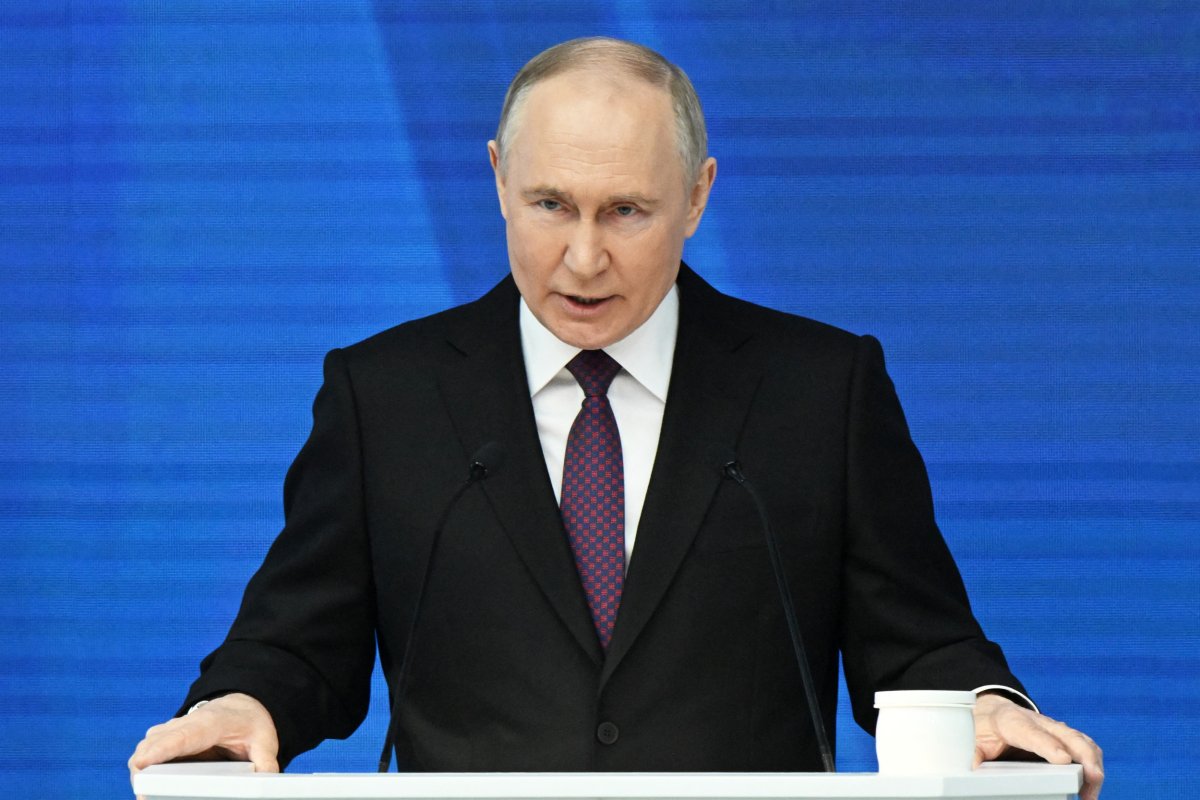Russia is having to use electronic parts meant for its air defense systems to manufacture its Sarmat intercontinental ballistic missile (ICBM) due to shortages caused by sanctions imposed over the war in Ukraine, according to a local report.
The information was reported by the VChK-OGPU outlet, which purports to have inside information from Russian security forces, shortly after Russian President Vladimir Putin said during his annual state of the nation address on Thursday that Russia will soon demonstrate the missiles "on combat duty."
The RS-28 Sarmat is a Russian liquid-fueled ICBM produced by the Makeyev Rocket Design Bureau and can reportedly carry up to 15 light nuclear warheads. It was built with the intention to replace the R-36 ICBMs, which had the NATO reporting name of Satan, and which is why its successor is often unofficially called Satan II, Newsweek previously reported.
Russia has struggled to replace some of the sophisticated technology it imported from the West, such as microchips, since it was hit with unprecedented sanctions over the invasion of Ukraine.
"Sources of VChK-OGPU say that today the Krasnoyarsk Machine-Building Plant is experiencing a serious shortage of electronic components...for the production of strategic missiles," the channel said.

"The electronics of the new RS-28 (Sarmat) missile system are largely of foreign origin and, due to sanctions, are experiencing a serious shortage. Now all efforts are being made to somehow correct the situation with the supply of sanctioned electronics, they are even sacrificing the production of S-400 air defense systems in Siberia, all for Sarmat," the post said.
Newsweek couldn't independently verify the claims and has contacted Russia's Defense Ministry for comment by email.
However, independent analysts have gone on record with their skepticism of the much-touted nuclear carrier.
Military and political observer of the Information Resistance Group, Oleksandr Kovalenko, told RBC Ukraine that he has serious doubts that Sarmat meets the declared parameters.
"It's a very problematic missile. The Russians couldn't even manage test launches, when they launched a model at 30 meters to check the powder booster, they couldn't prepare in time. And overall, there was only one full-scale test of Sarmat.
"Although during Soviet times, intercontinental ballistic missiles were tested for years, there were dozens of tests with constant error correction. I do think Sarmat exists, but the missile is unreliable and dangerous. That's why it's not produced in series," Kovalenko explained.
Putin previously said that the Sarmat will make Russia's enemies "think twice." The ICBM would "reliably ensure the security of Russia from external threats and make those who, in the heat of aggressive rhetoric, try to threaten our country, think twice," the Russian president said in 2022, shortly after the war in Ukraine began.
Putin ramped up his nuclear threats on Thursday, saying that Russia's "strategic nuclear forces are in a state of full readiness."
"Russia won't let anyone interfere in its internal affairs," Putin added, saying that there is a risk of a nuclear war breaking out if NATO members send ground troops to Ukraine, as suggested by French President Emmanuel Macron.
"[Western nations] must realize that we also have weapons that can hit targets on their territory. All this really threatens a conflict with the use of nuclear weapons and the destruction of civilization. Don't they get that?!" the Russian leader said.
"We remember the fate of those who once sent their forces to the territory of our country. But now the consequences for possible interventionists will be much more tragic," Putin added.
Do you have a tip on a world news story that Newsweek should be covering? Do you have a question about the Russia-Ukraine war? Let us know via worldnews@newsweek.com.
Uncommon Knowledge
Newsweek is committed to challenging conventional wisdom and finding connections in the search for common ground.
Newsweek is committed to challenging conventional wisdom and finding connections in the search for common ground.
About the writer
Isabel van Brugen is a Newsweek Reporter based in Kuala Lumpur. Her focus is reporting on the Russia-Ukraine war. Isabel ... Read more





